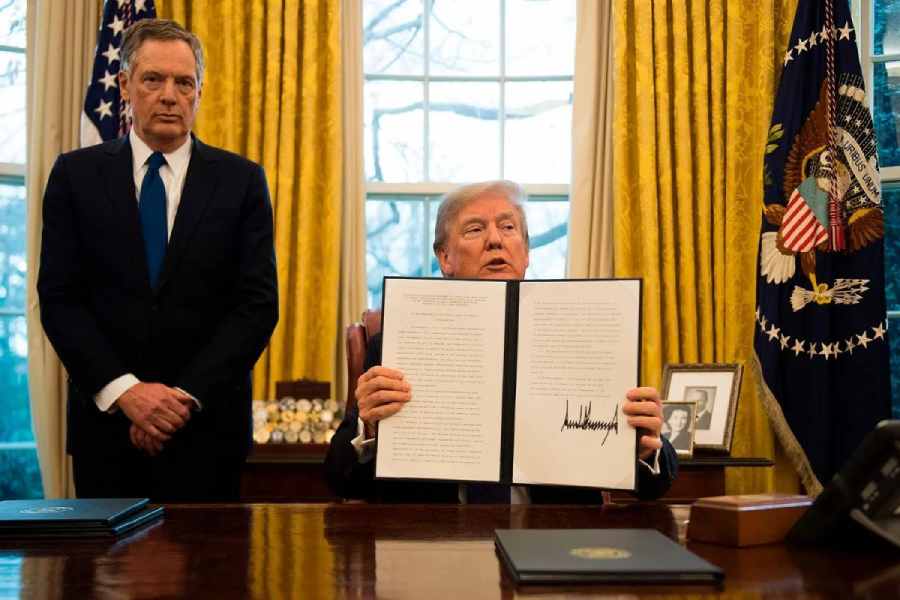President Donald Trump raising tariffs on imports into his country has been much talked about; what has received less attention is his silence over another matter. Higher tariffs are a way of securing a larger share of a country’s market for domestically-based producers. If high tariffs are accompanied by a simultaneous expansion of the home market, then a higher share for domestic producers need not mean smaller imports from abroad; but if there is no simultaneous expansion of the home market, then higher tariffs would necessarily mean smaller imports in absolute terms.
The obvious way that the home market can be expanded is through larger government spending that is financed either by a larger fiscal deficit or by higher taxes on the rich. In the former case, corresponding to larger government spending, there are no larger taxes on anyone and, hence, no reduction in anyone else’s consumption expenditure; so, the entire government spending is a net addition to aggregate demand. In the latter case, since the rich save a fair bit of their income (assume they save half), then taxing them by, say, Rs 100, to increase government spending by Rs 100, reduces their consumption by Rs 50 and their savings by Rs 50; when these Rs 100 are spent by the government, then there is a net increase in aggregate demand by Rs 50 (savings do not entail any demand for goods and services). Taxing the poor who consume the bulk of their incomes anyway and spending the tax proceeds hardly cause any net increase in aggregate demand.
The aspect of Trump’s high tariffs that has gone unremarked is that it is not accompanied by any measures to expand the home market through larger government spending financed in either of these two ways. Trump has no desire to enlarge the size of the fiscal deficit and he wants, if anything, greater tax concessions for the rich. His proposals, therefore, amount to lowering absolute imports, relative to what they would have otherwise been, through higher tariffs.
If America’s trading partners, who will be hit by lower exports to the US, could raise their own domestic aggregate demand through larger government spending financed in either of the two ways mentioned above, then there should be no reduction in their level of activity and employment. But they all have statutory limits to the size of their fiscal deficit relative to gross domestic product and since they operate at this limit anyway, they cannot raise their fiscal deficits. These statutory limits are imposed through legislation at the behest of globalised finance capital, which would shun any country that did not have such legislation; likewise, taxing the rich, among whom a prominent segment consists of the financers themselves, would lead to an outflow of finance from the country doing so. America’s trading partners, therefore, cannot counter the domestic unemployment-generating effect of American protectionism by increasing aggregate demand in other ways. Trump’s trade restrictions thus amount to exporting unemployment from the US to its trading partners; they amount to expanding domestic employment at the expense of one’s partners, or what is called a ‘beggar-thy-neighbour’ policy.
The only thing that America’s trading partners can do to counter US trade restrictions is by imposing trade restrictions of their own, which in the aggregate however would be counterproductive. Such competitive ‘beggar-thy-neighbour’ policies had been resorted to during the Great Depression of the 1930s after the collapse of the Gold Standard and had predictably proven futile in overcoming the Depression anywhere because of their very pervasiveness.
Put differently, if we take the world capitalist economy as a whole, since all governments of nation-states are in thraldom to finance capital that is international (or globalised) within a regime of relatively free capital (including financial) flows, no government can take the initiative in increasing aggregate demand within its borders; hence the aggregate demand in the world capitalist economy as a whole does not increase. Trade restrictions by a country therefore amount to snatching a larger part of this world aggregate demand for itself. This can succeed for any country only if others do not retaliate; but if others do, then all countries remain stuck in the quagmire of unemployment as before.
Even this is untrue: aggregate unemployment worsens through competitive trade restrictions. For tariff protection to be at all meaningful, domestic prices must rise relative to money wages; that is, real wages must fall. If they did not fall, then a general 10% import tariff would raise domestic prices exactly by 10% since profit margins are downward inflexible and a country invariably has some unavoidable essential import that initiates the cost-push; hence, for the post-tariff situation to be different from the pre-tariff one, real wages must fall. But if world aggregate demand is not being increased through larger government expenditure anywhere, the struggle over markets, leading to a reduction in real wages everywhere, would reduce world aggregate demand and hence world employment.
Trump’s tariff hike has adverse effects no matter what its sequel. If America’s trading partners do not retaliate, then America may witness larger employment, but that will be at the expense of its partners. If they do retaliate, then nobody gains but they collectively witness larger unemployment. The problem with Trump’s tariff hike is not with the tariff hike as such but with its occurring in a setting where it is unaccompanied by restrictions on the free flow of finance. Controls over financial flows, however, would violate the essence of neoliberal capitalism and challenge the hegemony of globalised finance; Trump would scarcely do that.
Prabhat Patnaik is Professor Emeritus, Centre for Economic Studies, Jawaharlal Nehru University, New Delhi











